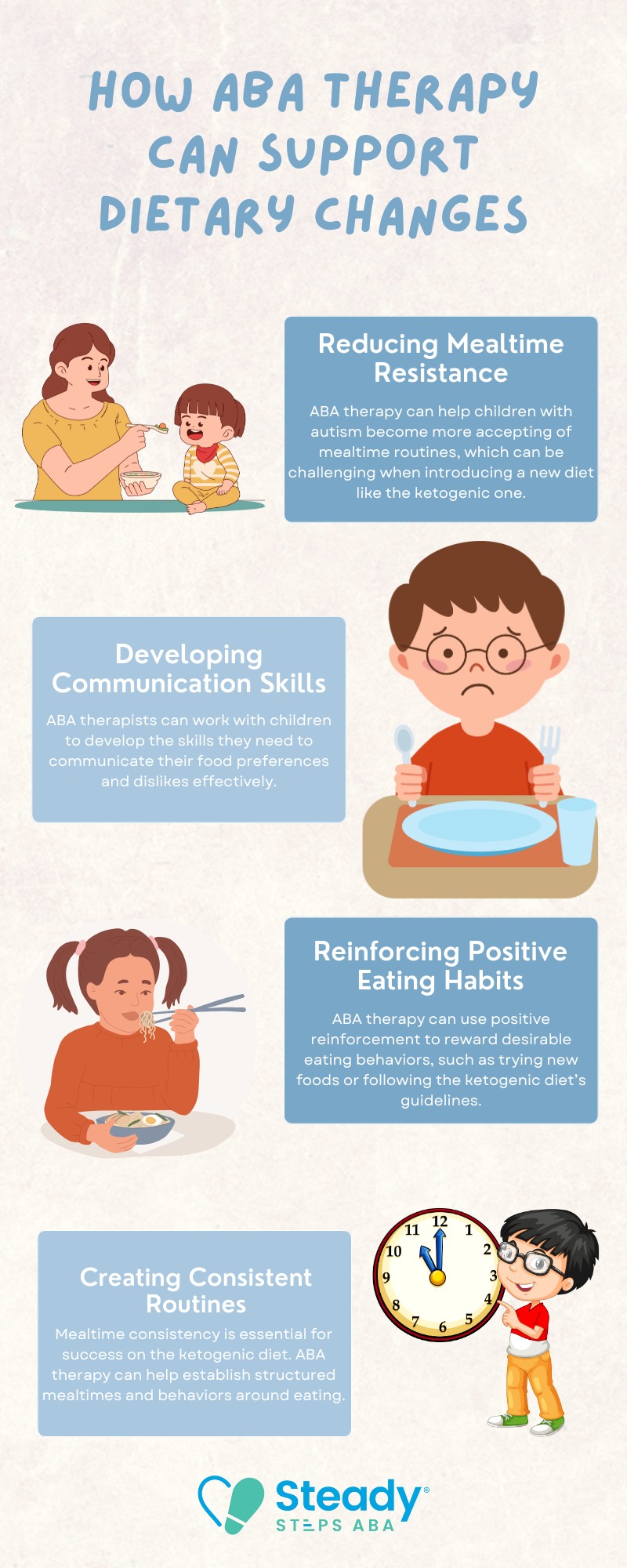Key Points:
- The ketogenic diet for autism has gained attention as a potential treatment for behavioral issues and neurological function.
- Early research suggests benefits for some children, including improvements in focus and social skills.
- A well-structured ketogenic diet may help reduce hyperactivity, irritability, and other autism-related behaviors.
The ketogenic diet for autism spectrum disorder (ASD) refers to a high-fat, low-carbohydrate diet that promotes ketosis in the body. This diet has been explored as a potential way to help children with autism manage certain behaviors and improve brain function.
The ketogenic diet was originally developed to treat epilepsy, a condition that has a 12% prevalence rate among autistic individuals. Parents and practitioners have reported various benefits, including improvements in social behaviors, speech, and sensory processing.
In this article, we’ll go over the factors that go into a ketogenic diet, provide examples, and offer helpful tips to ensure that you are implementing it effectively.
Does the Ketogenic Diet Help with Autism?
There is no definitive answer to whether the ketogenic diet helps with autism, but early research and anecdotal reports suggest potential benefits for some children.
Studies on the ketogenic diet for autism are still in their early stages, and while some individuals experience positive changes, the results are not universal. It’s important to note that the ketogenic diet is not a cure for autism, but rather a dietary approach that may alleviate specific symptoms related to the condition. The ketogenic diet might help with:
- Reducing hyperactivity and impulsive behaviors.
- Improving social interaction and communication skills.
- Decreasing irritability and aggression.
However, larger-scale studies are needed to fully understand how the ketogenic diet might benefit children with autism in the long term.
4 Benefits of Ketogenic Diet for Autism
While research on the ketogenic diet for autism is still emerging, there are several potential benefits that parents and caregivers have reported. Some children with autism have shown noticeable improvements in behavior, mood, and even cognitive development. Here are some of the most commonly reported benefits:
1. Reduction in Seizures
Since the ketogenic diet was originally developed to treat epilepsy, it is particularly effective for children with autism who also experience seizures.
2. Improved Cognitive Function
Some studies suggest that the ketogenic diet can improve attention, focus, and memory, which are often areas of concern for children with autism.
3. Improved Social Interaction
For some children, the ketogenic diet leads to better social engagement and a greater desire to interact with others.
4. Enhanced Speech
Some anecdotal reports suggest that children on the ketogenic diet may experience improvements in language development, including better verbal communication and comprehension.
While these benefits may not apply to every child with autism, some families have reported positive changes after incorporating the ketogenic diet.
How Ketogenic Diet Affect Brain Function in Autism
The ketogenic diet has been shown to alter brain activity by shifting the body’s energy source from carbohydrates to fats. This shift may have a profound impact on how the brain functions, particularly in individuals with autism. Several aspects of brain function are affected by the ketogenic diet:
1. Neurotransmitter Regulation
Ketones may help stabilize the levels of neurotransmitters in the brain, leading to improved mood and behavior.
2. Decreased Inflammation
Inflammation in the brain has been linked to autism-related behaviors. The ketogenic diet may reduce this inflammation, potentially leading to better brain function.
3. Increased GABA Production
The ketogenic diet increases the production of gamma-aminobutyric acid (GABA), a neurotransmitter that plays a key role in calming neural activity. This could help reduce anxiety and hyperactivity in children with autism.
4. Neuroplasticity
By promoting better brain function, the ketogenic diet might help improve neuroplasticity—the brain’s ability to adapt and reorganize itself, which is important for learning and development.
Though these brain function improvements have been noted in individuals with epilepsy, researchers believe they may also benefit children with autism who have similar neurological challenges.
4 Challenges of Ketogenic Diet for Autism
While the ketogenic diet may offer benefits for some children with autism, it’s not without its challenges. Parents considering this diet should be aware of the potential hurdles:
1. Strict Dietary Requirements
The ketogenic diet requires careful planning and strict adherence, which can be challenging for parents and caregivers. Foods must be carefully measured to ensure the correct balance of fats, proteins, and carbohydrates.
2. Nutrient Deficiency Risks
If not managed properly, the ketogenic diet can lead to nutrient deficiencies, particularly in vitamins and minerals. Supplementation and regular monitoring are necessary to maintain a balanced and healthy diet.
3. Social and Lifestyle Constraints
The strict nature of the ketogenic diet may make it difficult for children to participate in social gatherings, school lunches, or family meals where food options may not be compliant with the diet.
4. Potential Side Effects
While the ketogenic diet can have positive effects, it also has potential side effects, such as constipation, dehydration, and an increased risk of kidney stones.
Due to these challenges, it’s crucial to have guidance from a healthcare provider and a nutritionist when implementing the ketogenic diet for autism. Ongoing support and adjustments are often needed to ensure the diet is both effective and safe.
When dealing with food aversions in autism, it’s essential to understand how these challenges impact behavior and nutrition. The ketogenic diet, for example, can be particularly helpful, but it requires careful monitoring and expert guidance. In our article “How Food Aversions in Autism Affect Behavior & Nutrition,” we dive deeper into how food sensitivities influence both dietary choices and behavior.
How ABA Therapy Can Support Children Following the Ketogenic Diet
ABA therapy, or Applied Behavior Analysis, is an evidence-based treatment that focuses on improving specific behaviors and skills in children with autism. While ABA therapy does not directly address nutrition or dietary choices, it can be an essential part of a comprehensive treatment plan that includes the ketogenic diet for autism.
Here’s how ABA Therapy can help support dietary changes:

By combining ABA therapy with the ketogenic diet, families can address both behavioral and dietary aspects of autism, leading to a more holistic approach to care.
Start Your Child’s Journey to Success with ABA Therapy Today
Steady Steps ABA offers expert ABA therapy in Maryland, helping children with autism develop important life skills, including those related to eating and behavior.
We understand that implementing dietary changes, like the ketogenic diet, requires patience, consistency, and professional support. Our dedicated therapists provide personalized guidance, helping families navigate mealtime challenges and promoting positive behaviors.
If you’re considering the ketogenic diet for your child with autism, contact us today to learn how our ABA therapy in Maryland can complement your dietary plan and foster meaningful progress in your child’s development.





